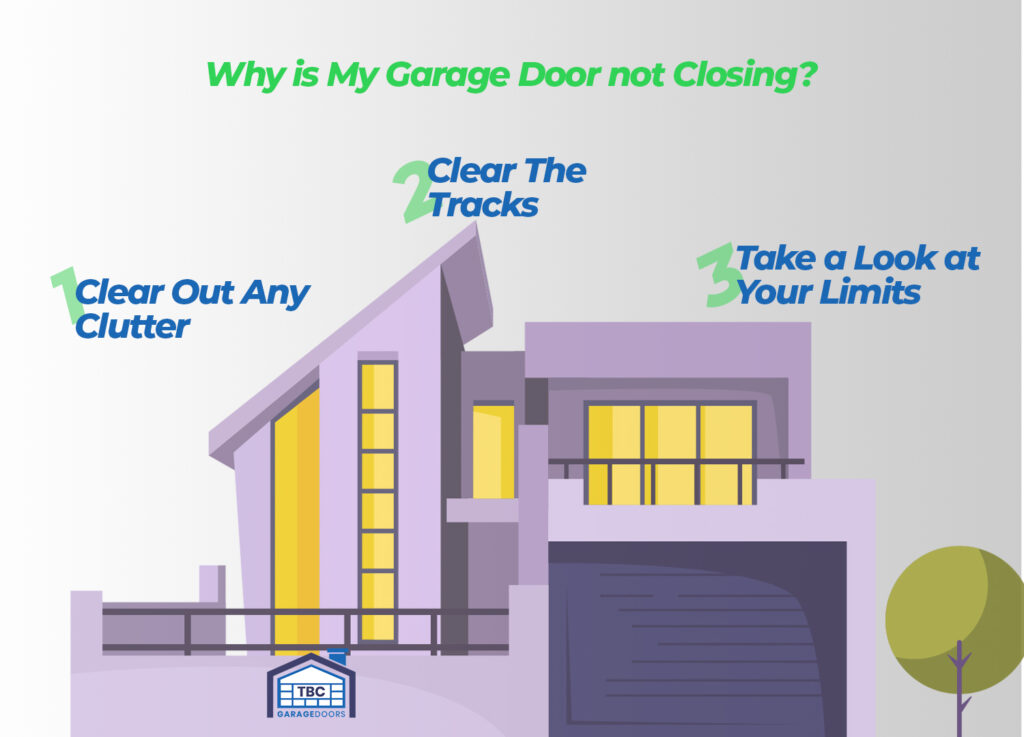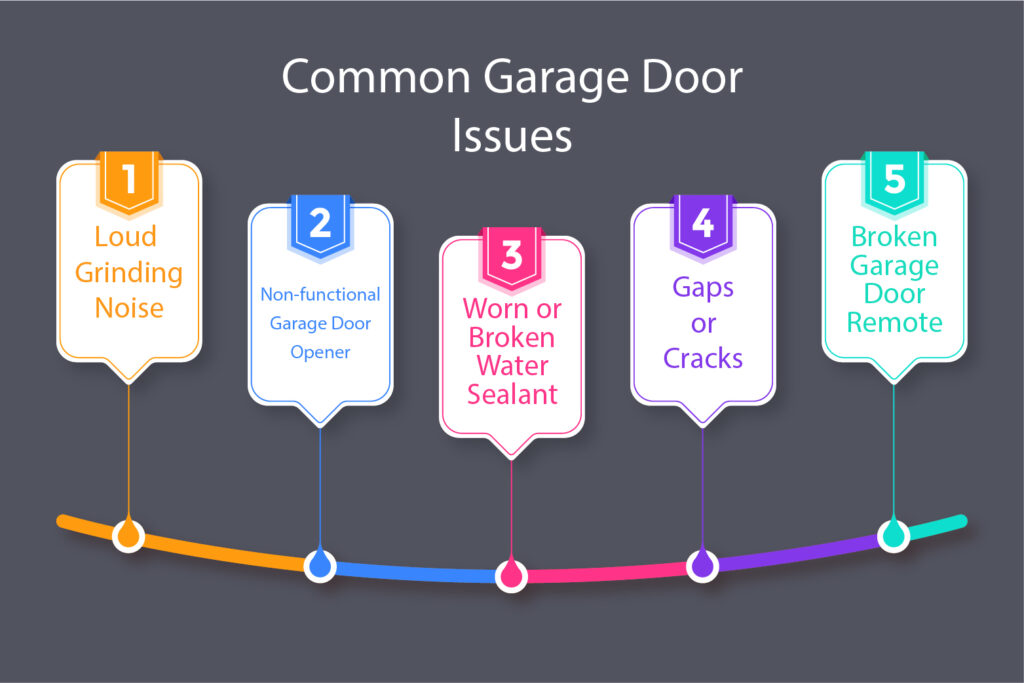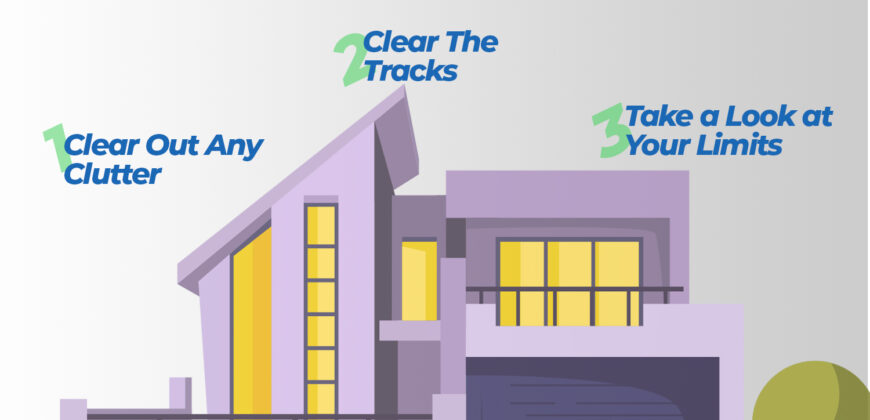Common Garage Door Problems and Tips on Solving Them
Your garage door is probably the most functional part of your home and there’s no harm in knowing the common garage door problems and tips on solving them. Due to how many cycles it makes in a year, it is easily prone to various types of damage. In this article, discover different garage door issues and tips on fixing them.
Why Is My Garage Door Not Closing?

Garage door no closing is one of the common garage door problems facing people recently. Having a garage door that refuses to close or open can be very frustrating. At times all you require is a simple fix, such as replacing the garage door opener batteries. Other times the cause is a much bigger problem that may require professional repair. A professional garage door expert should only perform problems such as garage door track altering or spring replacement.
Here are three simple ways to ensure your garage door closes properly:
1. Clear Out Any Clutter
Clutter or obstructions that can block the garage door sensor are the first problems to check if your garage door doesn’t close. Begin by checking your sensor lights. Depending on what brand of garage door you own, you might notice your sensor lights dim, flash or go out completely when their beam is interrupted.
Even when nothing seems to be in the way, give your sensor the eyes a proper cleaning, and sometimes debris, dirt, or even small insects such as spiders can make themselves at home and interrupt the beam. This will stop the door from opening.
If your garage door still doesn’t shut after these, double-check and ensure that all sensors are properly aligned with each other. If they are not properly aligned, bend them gently to restore a clear connection. This will help you secure a clean escape from your garage.
2. Clear The Tracks
To get your garage door to close again, you might want to pay attention to your garage door rollers and tracks. When you do not maintain your garage door track properly can cause the components to malfunction.
Begin by cleaning metal rollers with a toothbrush to remove any grime; then, we’ll beat them with a product such as motor oil or any known silicone-based products. If your door rollers are made of nylon, only lubricate the bearings. Next, takes a cloth and some brand oil and wipe the tracks clean, removing any buildup that may prevent the door from closing properly.
If this still doesn’t work, contact a garage door expert before carrying out any extensive DIY repairs.
3. Take a Look at Your Limits
After looking at your garage door sensor eyes and alignment, if your garage door still doesn’t close properly, the limits might be the problem. These settings, which are also referred to as traveling limits, alert your garage door opener how far they should travel before closing fully. This prevents the door from crushing objects that are in its path.
If your garage door limit switch settings are too high, the garage door senses the floor as an obstruction. This will cause the door to open again immediately after closing. However, this can easily be remedied with a few measurements and a screwdriver.
Consult the website of your door manufacturer or the instruction manual so that you can learn how to adjust your garage door limit switch.
How do I know if I Need a New Garage Door Opener?
For your garage door to function effectively, you need a properly working garage door opener. However, like all mechanical devices, your garage door opener cannot last forever. Your opener also does have the ability to update itself and keep up with technological advancement.
To keep your garage door functioning smoothly, you should replace your garage door opener regularly. Here are a few ways to know if you need a new garage door opener:
Failure to Close or Open
Although many parts of your garage door might cause your garage door not to open, your door opener is the problem most times. If you push your opener remote and hear the garage door motor try to open or close without actually moving, the opener is the problem. Try simple fixes such as changing the batteries or replacing the remote before you change the door opener.
Your Garage Door Opens Slowly
If you notice that your garage door is taking longer to close and open then it did in the beginning, you should check your garage door opener. Slow opening doors may be a sign that the door opener is having a bit of trouble lifting the door’s weight and needs a replacement.
Outdated Technology
Certain features such as ultra-quiet operation, outdoor keypads, backup batteries and even remote operation can make your door opener a lot more efficient. If your opener is technologically lacking, it’s time for an upgrade.
Loud Noises
As your garage door opener gets older, the motor in your opener will find it more difficult to pull the garage door open. Once you notice the opener is making more noise than usual, consult a professional.
Unreliability
At times, you might notice your garage door opener stop working randomly. These random pauses can be inconvenient and cause the opener to overheat. Once you notice random breaks in operation, it’s time to replace your garage door.
How Often Should You Replace Your Garage Door?
It is very easy for you to forget about your garage door until it starts to malfunction. Ideally, you should replace all the components of your garage door at the same time.
However, garage door springs should be replaced most frequently as they last only about five years. The garage door itself can last 10 to 20 years. Your garage door opener, with regular maintenance, should last about 15 to 20 years.
Common Garage Door Issues and How To Fix Them

Due to how many cycles your garage door endures daily, annual maintenance and garage door repairs are common. There are a few garage door issues you can identify and rectify yourself. These include:
Loud Grinding Noises
Squeaky sections, loose hardware and shabby parts are annoyances that have simple solutions. Generally, tackle any unusual sounds with lubricant. Apply enough lubricant directly on the squeaky parts of the garage door.
Non-functional Garage Door Opener
If your drive screw or chain operated garage door won’t function properly, all you need is some lubricant to reduce friction. Work a generous amount of garage door spray lube or silicone-based lube to the full length of the garage door opener.
Worn or Broken Weather Sealant
Your weather sealant is put in place to prevent air leaks and keep water out. It also helps to reduce street noise. If you notice wear on your sealant, you should replace it immediately.
Gaps or Cracks
These are pretty common, especially for garage doors made from wood. To prevent the cracks from worsening, use a sealant or a waterproof filler to seal the cracks.
Broken Garage Door Remote
This is one of the most common issues of garage doors. You should begin by checking that the batteries are not dead. If the batteries are not the issue, refer to the usual manual and follow the steps to reprogram your remote. If this still doest work, you might consider getting a replacement remote.
Your Garage Door Does Not Seal To The Bottom
If you notice this, make use of pipe insulation. The insulation should be secured to the portion of the door that does not seal properly.
Garage Door Maintenance Tips
Regular maintenance might be all your garage door needs to close properly. Here are a few garage door Toronto maintenance tips that can help you resolve common garage door problems:
Test Your Garage Door Balance
If you have a garage door that is not properly balanced, it will cause your garage door opener to work twice as hard. This will lead to wear and tear, preventing it from lasting long.
Pay Attention To Your Garage Door
The best maintenance tip for your garage door is to observe it whenever it is at work. Take note of how much noise it makes when it opens. How smoothly does the garage door open? Look at the pulleys, springs and cables and ensure that they look symmetrical.
Check For Loose Hardware
Your garage door moves up and down several thousand times a year. This motion causes a lot of vibration and movement, which can cause the hardware to become loose. Use a socket wrench to tighten all bolts and roller brackets.
Replace Your Weatherstripping
Carefully observe the rubber seal strip located at the bottom of your door. If it is cracked or brittle, immediately replace the weatherstripping to keep out weather elements, insects or even small animals.
Clean Your Garage Door Tracks
Ensure that the garage door tracks on both sides are debris free. You can also use a level to check your plumb. However, it is best to leave any major adjustments to professional garage door technicians.
Check Your Rollers
Whether you have nylon or steel rollers, you should inspect them at least twice a year. You should also replace them every seven years, and if your garage door is heavy-duty, more frequently.
Lubricate Your Garage Door Parts
When your garage door is properly lubricated, it will aid seamless operation. Make use of white lithium grease on the stress and chains. The overhead springs should be coated with a spray lubricant.
Check Your Garage Door Cables
While it is not advisable to tamper with the high tension cables responsible for lifting your door, you should inspect them. Observe their condition and call a pro if you notice damage near the bottom roller bracket. You should also check for broken strands.
Conclusion
When you have a garage door expert, resolving Common Garage Door problems becomes easy. If you need professional assistance for your garage door Toronto, you can contact TCB Garage Doors. We are a reputable company specializing in garage door maintenance near me, door opener maintenance, torsion spring maintenance, etc.
Some of our services include garage door framing, garage door spring installation, garage door opener belt installation/repair, among many others. All our technicians are insured and licensed. We also offer affordable pricing with a 90-day guarantee. We offer emergency services and are available 24/7.


Recent Comments